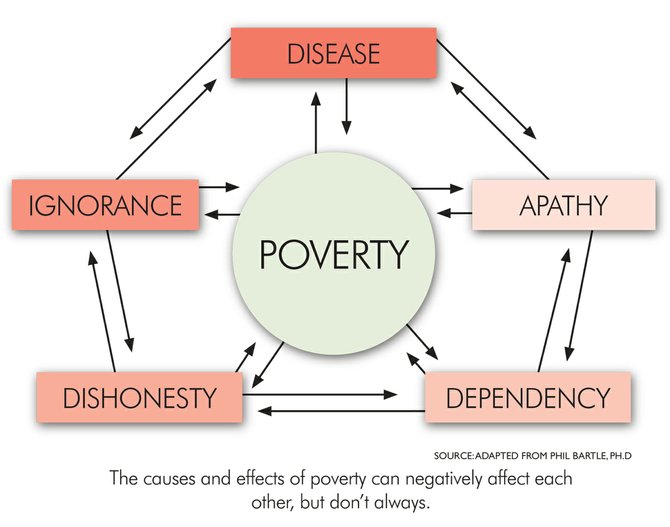The poverty cycle is about much more than people being broke. It tends to be a deep wound, sociology professor Phil Bartle writes on his website. “It includes sustained low levels of income for members of a community,” he writes. “It includes a lack of access to services like education, markets, health care, lack of decision making ability, and lack of communal facilities like water, sanitation, roads, transportation and communications.”
It might mean that a family lives in a community with dilapidated homes, lots of broken windows, no safe playgrounds and no real grocery store (“food deserts,” these neighborhoods are often called).
They’re afraid to go outside and exercise, so they don’t. There might be little of beauty on the street, litter and lots of junky cars parked where grass ought to be.
Bartle calls this a “poverty of spirit”—one “that allows members of that community to believe in and share despair, hopelessness, apathy and timidity.” He adds: “Poverty, especially the factors that contribute to it, is a social problem, and its solution is social.”
The solution to poverty isn’t just attacking its symptoms, or effects; it must be about tackling the “factors” that make it such a tough cycle, he advises. Put another way, giving food to the poor may help with short-term hunger—which is necessary—but it doesn’t help break the cycle of poverty in which the direct causes and effects are often the same (as in crime causing poverty leading to more crime).
“The simple transfer of funds, even if it is to the victims of poverty, will not eradicate or reduce poverty. It will merely alleviate the symptoms of poverty in the short run,” he writes. We must remove the factors to end the cycle.
The sociologist says that big “causes” created cycles of poverty (he names “colonialism, slavery, war and conquest” as the big four). But “factors” make it continue, meaning that we must focus on the factors. (It’s not like we can rewrite the history that created, say, the discrimination toward African Americans.) Poverty based on historic causes, like war or slavery, will continue through the generations if the factors aren’t changed. And they can be.
- Ignorance: Not stupidity or foolishness, but a lack of needed knowledge. It’s important to determine what information is needed in a community and then share it.
- Disease: Sick communities cannot produce well or create wealth due to high absenteeism and other factors. Prevention is key, as is good health information.
- Apathy: Often people in poverty do not believe they can overcome poverty. They feel powerless to overcome challenges; it can even be rooted in their religion: heaven will come later. Bartles cites a Russian proverb, “Pray to God, but also row to shore,” as a guiding principle and urges mobilizers to both encourage and praise those in poverty so they believe and want to overcome their conditions. Help them believe in themselves by believing in them.
- Dishonesty: Bartle points to corruption and greed, such as when a public official diverts money for community use into private pockets, as a major cause of poverty. For instance, if a tutoring service paid to help public-school kids skims money, it takes it away from the families that need the help to learn to help themselves.
- Dependency: Too much reliance on charity can rob one’s potential to help themselves. Sustained straight charity weakens, while community empowerment, well, empowers people to lift themselves out of poverty.
More like this story
More stories by this author
- EDITOR'S NOTE: 19 Years of Love, Hope, Miss S, Dr. S and Never, Ever Giving Up
- EDITOR'S NOTE: Systemic Racism Created Jackson’s Violence; More Policing Cannot Stop It
- Rest in Peace, Ronni Mott: Your Journalism Saved Lives. This I Know.
- EDITOR'S NOTE: Rest Well, Gov. Winter. We Will Keep Your Fire Burning.
- EDITOR'S NOTE: Truth and Journalism on the Front Lines of COVID-19



Comments
Use the comment form below to begin a discussion about this content.
comments powered by Disqus